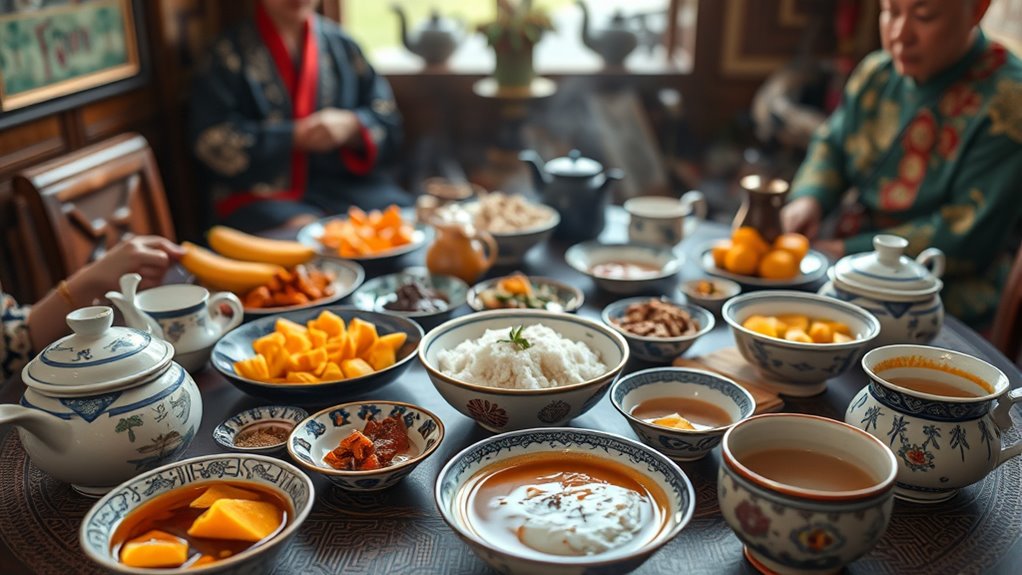When discussing dreams at breakfast worldwide, avoid boastful achievements or sensitive topics like personal ambitions that might disrupt harmony. In many cultures, talking freely about aspirations or interpreting dreams can seem self-centered or taboo, especially if it contradicts local norms. Also, be cautious about what you say regarding food or traditions, as these can be deeply respected and sensitive. Keep respectful silence on personal or spiritual dreams until you understand the unspoken rules—there’s more to uncover if you continue to explore.
Key Takeaways
- Avoid discussing personal dreams or ambitions openly, as it may be considered boastful or disruptive to social harmony in many cultures.
- Refrain from making jokes or comments about hosts’ efforts or food, which can be seen as disrespectful or insensitive.
- Be cautious when mentioning aspirations related to wealth, status, or success, as these can be viewed as self-centered or inappropriate.
- Do not talk about personal life or intimate details during breakfast, especially in cultures valuing privacy and modesty.
- Maintain a respectful tone and choose neutral topics to prevent offending hosts or violating cultural norms around dreams and aspirations.

Have you ever wondered why certain dreams are considered taboo across different cultures? It’s often tied to deeper social norms and shared beliefs that shape daily interactions, especially when it comes to something as routine as breakfast. Food etiquette and social sensitivities play a huge role in determining what’s acceptable to say or do during these morning rituals. In many cultures, breakfast isn’t just about fueling your body; it’s a social event that reflects respect, tradition, and harmony. Saying the wrong thing over the food can unintentionally offend or create discomfort, especially if your words touch on sensitive topics or break unspoken rules. For example, in some Asian countries, discussing certain aspects of one’s personal life at the breakfast table is considered rude, as it might disrupt social harmony or embarrass others. Similarly, in Middle Eastern cultures, making jokes about food or the people preparing it can be seen as disrespectful, violating social sensitivities that emphasize reverence for hospitality and tradition. In Western contexts, casual remarks about dieting or weight during breakfast might seem harmless, but in other cultures, such comments could be viewed as intrusive or disrespectful to cultural values surrounding food and body image.
Understanding these nuances is vital because breakfast conversations often serve as a reflection of broader social attitudes. For instance, mentioning dreams or aspirations in a way that appears boastful or self-centered can be frowned upon, especially if it disrupts the collective harmony. Many cultures value humility and modesty, so bragging about one’s achievements or wealth over breakfast can be seen as inappropriate. Conversely, talking about dreams—whether literal or aspirational—should be approached with sensitivity, as some societies view dreams as symbolic messages that should be interpreted carefully, and discussing them openly might be taboo. The way you speak about food, your tone, and even the topics you choose to discuss can influence how others perceive you. It’s essential to be mindful of local customs and social sensitivities to avoid offending or alienating your hosts. Paying attention to these unwritten rules helps foster mutual respect and shows that you value their cultural norms, making your interactions more genuine and meaningful. Additionally, understanding the predictive modeling of social behaviors can help you navigate these cultural nuances more effectively. Ultimately, being aware of what not to say at breakfast isn’t just about manners; it’s about understanding and respecting the social fabric that holds communities together.
Frequently Asked Questions
Are Breakfast Taboos Different for Specific Religious Groups?
You might wonder if breakfast taboos vary for specific religious groups. Yes, they often do due to religious dietary restrictions and cultural sensitivity. For example, some groups avoid pork or alcohol, impacting breakfast choices. Recognizing these differences shows respect and helps you avoid unintentional offense. Being aware of religious dietary restrictions allows you to navigate breakfast conversations and meals thoughtfully, fostering understanding and respect across cultural boundaries.
How Do Cultural Taboos Evolve Over Time?
Did you know that nearly 60% of cultural practices change within a century? Cultural taboos evolve over time as societies experience shifts and adapt, influenced by globalization, technological advances, and social movements. You can see this in how traditions are preserved or altered, with some customs fading and others transforming to fit modern values. These cultural shifts help communities balance honoring tradition while embracing change, shaping their collective identity.
Can Breaking Breakfast Taboos Cause Serious Social Consequences?
Breaking breakfast taboos can lead to serious social repercussions, especially if you cause culinary misunderstandings or offend local customs. You might face awkwardness, social exclusion, or even damage relationships, depending on the cultural context. It’s best to observe and respect local breakfast traditions to avoid these issues. Being mindful of what you say and do helps you connect better and prevents uncomfortable situations rooted in cultural differences.
Are There Universal Breakfast Taboos Shared Worldwide?
Did you know that around 80% of cultures have specific food etiquette for breakfast? When you consider dining customs worldwide, it’s clear that some taboos, like not discussing politics or religion, are common. However, universal breakfast taboos don’t really exist because food etiquette varies greatly. So, you should always respect local customs to avoid offending others and guarantee a harmonious dining experience.
How Should Travelers Learn About Local Breakfast Customs Effectively?
When learning about local breakfast customs, you should approach it with cultural sensitivity and respect for local etiquette. Talk to locals, read travel guides, or join cultural tours to gain insights. Observe how people behave and what they eat. Asking polite questions shows your genuine interest. By doing this, you’ll show respect for traditions and enjoy a more authentic experience without offending anyone.
Conclusion
As you sit down for breakfast across the globe, remember that words can build bridges or burn them. While a simple compliment in Japan might spark smiles, in another culture, a similar phrase could offend. Just like the delicate aroma of coffee contrasts with the bitter taste of a taboo topic, your awareness can turn an awkward silence into a warm connection. Embrace these differences, and your mornings become richer, more respectful, and truly worldwide.











